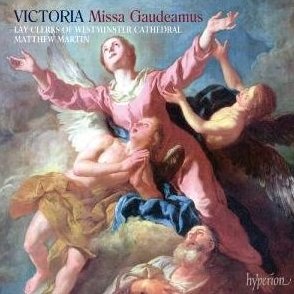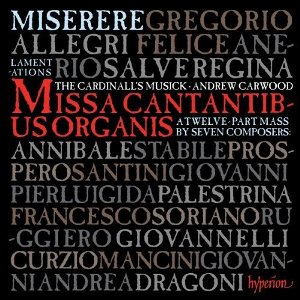Victoria: Missa Gaudeamus etc.
Originally published on musicalcriticism.com
30 June 2009
Tomás Luis de Victoria is often described as one of the great composers of the mature polyphonic style and although his music is, broadly speaking, from the 'Palestrina School' he infused it with a uniquely Spanish atmosphere. Westminster Cathedral Choir are, of course, specialists in this area and have been performing the works of the English and Continental Renaissance composers since the cathedral opened in 1903 when the first master of music, Richard Terry, began to build the choir's reputation on such music. Renaissance works have remained the cornerstone of the choir's activity ever since.
This latest release by the Lay Clerks of Westminster Cathedral, and directed by the Assistant Master of Music, Matthew Martin is particularly exciting since the choir men don't often record on their own even though they sing several services without the boys voices each week. Missa Gaudeamus is presented within a celebration for the Feast of the Assumption of the Blessed Virgin Mary, but rather than reconstruct an actual historic service they have chosen to record the mass within a 'liturgical offering illustrating the complex liturgical structures becoming available in a period when the resources for the enrichment of the liturgy were growing steadily' as Jon Dixon explains in his notes. And what better choir to navigate these complicated waters than one who sings this liturgy regularly.
In this 'programme' the Mass Propers are sung to traditional plainchant and I was pleasantly surprised by how mesmeric these performances prove to be. The tenors and basses have a solid and confident tone that suits the large acoustic and since plainchant is a central part of their daily routine they also have a highly developed musical style that prevents the monody from stagnating.
The Mass Ordinary is the Victoria setting Missa Gaudeamus based on the motet Iubilate Deo omnis terra, by Morales. The tenors and basses are joined by seven countertenors, all regular singers with the choir, who have a slightly metallic sound which works particularly well in this repertoire. There seems to be a slight approximation to a French 'eu' sound [y] from one or two of them when a more English vowel is used by the other voices and this discrepancy can be slightly distracting at times, particularly in the 'Gloria' where it is quite obvious on 'bonae voluntatis'. However, the Lay Clerks make a gloriously full-bodied sound with plenty of contrast and colour throughout the polyphony of both the mass setting and Victoria's beautiful motet Vidi speciosam. This is very impressive singing indeed.
Four organ works by Frescobaldi are played deftly by Thomas Wilson and they contribute strongly to the liturgical atmosphere of the disc as a whole. The last one, Frescobaldi's Recercar: Sancta Maria for organ and choir is a fascinating little piece since the plainsong of the choir's part has the angularity of an electrocardiogram trace yet the overall effect is actually rather calm and moving.
This is a really atmospheric disc and also a fascinating one because the history of Westminster Cathedral choir singing Victoria's music throughout the twentieth century and beyond has been recorded frequently enough for us to hear how their style has changed without losing that continental feel that is so hard to quantify. I suspect that singing this repertoire regularly in the same building influences much of their 'house style' but whatever the contributory factors, Westminster Cathedral Choir is one of this country's most spectacular choral offerings and this disc assures us that their important tradition is in safe hands.
Lay Clerks of Westminster Cathedral/Matthew Martin (Hyperion CDA 67748)
30 June 2009
Tomás Luis de Victoria is often described as one of the great composers of the mature polyphonic style and although his music is, broadly speaking, from the 'Palestrina School' he infused it with a uniquely Spanish atmosphere. Westminster Cathedral Choir are, of course, specialists in this area and have been performing the works of the English and Continental Renaissance composers since the cathedral opened in 1903 when the first master of music, Richard Terry, began to build the choir's reputation on such music. Renaissance works have remained the cornerstone of the choir's activity ever since.
This latest release by the Lay Clerks of Westminster Cathedral, and directed by the Assistant Master of Music, Matthew Martin is particularly exciting since the choir men don't often record on their own even though they sing several services without the boys voices each week. Missa Gaudeamus is presented within a celebration for the Feast of the Assumption of the Blessed Virgin Mary, but rather than reconstruct an actual historic service they have chosen to record the mass within a 'liturgical offering illustrating the complex liturgical structures becoming available in a period when the resources for the enrichment of the liturgy were growing steadily' as Jon Dixon explains in his notes. And what better choir to navigate these complicated waters than one who sings this liturgy regularly.
In this 'programme' the Mass Propers are sung to traditional plainchant and I was pleasantly surprised by how mesmeric these performances prove to be. The tenors and basses have a solid and confident tone that suits the large acoustic and since plainchant is a central part of their daily routine they also have a highly developed musical style that prevents the monody from stagnating.
The Mass Ordinary is the Victoria setting Missa Gaudeamus based on the motet Iubilate Deo omnis terra, by Morales. The tenors and basses are joined by seven countertenors, all regular singers with the choir, who have a slightly metallic sound which works particularly well in this repertoire. There seems to be a slight approximation to a French 'eu' sound [y] from one or two of them when a more English vowel is used by the other voices and this discrepancy can be slightly distracting at times, particularly in the 'Gloria' where it is quite obvious on 'bonae voluntatis'. However, the Lay Clerks make a gloriously full-bodied sound with plenty of contrast and colour throughout the polyphony of both the mass setting and Victoria's beautiful motet Vidi speciosam. This is very impressive singing indeed.
Four organ works by Frescobaldi are played deftly by Thomas Wilson and they contribute strongly to the liturgical atmosphere of the disc as a whole. The last one, Frescobaldi's Recercar: Sancta Maria for organ and choir is a fascinating little piece since the plainsong of the choir's part has the angularity of an electrocardiogram trace yet the overall effect is actually rather calm and moving.
This is a really atmospheric disc and also a fascinating one because the history of Westminster Cathedral choir singing Victoria's music throughout the twentieth century and beyond has been recorded frequently enough for us to hear how their style has changed without losing that continental feel that is so hard to quantify. I suspect that singing this repertoire regularly in the same building influences much of their 'house style' but whatever the contributory factors, Westminster Cathedral Choir is one of this country's most spectacular choral offerings and this disc assures us that their important tradition is in safe hands.
Lay Clerks of Westminster Cathedral/Matthew Martin (Hyperion CDA 67748)



Comments
Post a Comment